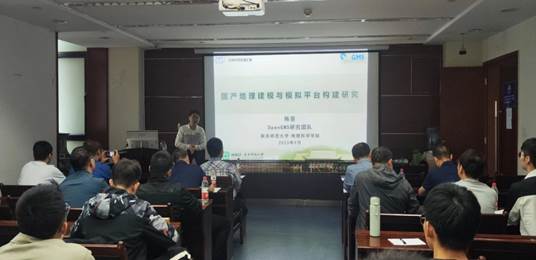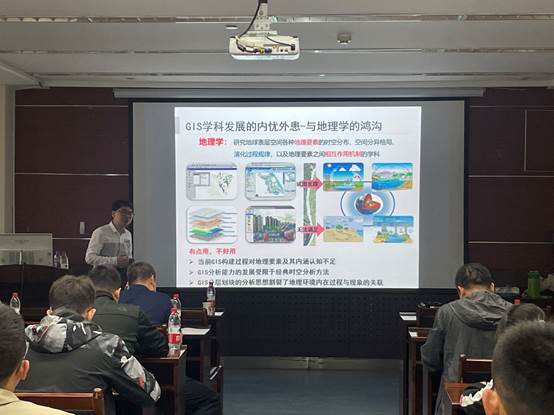At the invitation of the Department of Geography at the College of Earth and Environmental Sciences, Lanzhou University, Professor Chen Min from Nanjing Normal University visited our campus for academic exchange from September 21st to 22nd. On the morning of September 22nd, from 10:00 AM to 12:00 PM, he delivered an academic presentation titled "Research on the Construction of Domestic Geographic Modeling and Simulation Platforms" in Room 1615 of the Guanyun Building on our Chengguan Campus. The presentation was chaired by Professor Geng Haopeng from the College of Earth and Environmental Sciences, and it was attended by faculty members, graduate students, and undergraduate students from the Department of Geography.

Professor Chen Min's presentation primarily covered the current domestic and international research progress in geographic modeling platforms and introduced the advancements of Nanjing Normal University's OpenGMS. He pointed out various existing issues in the current GIS construction process, such as inadequate recognition of geographic elements and their meanings, limitations in GIS analytical capabilities due to classical spatiotemporal analysis methods and the analytical mindset of GIS layering and partitioning, which disconnects the intrinsic processes and phenomena of geographic environments. He also emphasized that these issues can be better addressed through the introduction of geographic analysis and simulation methods and technologies. Professor Chen Min introduced the innovative research path of Nanjing Normal University's research team in "production, learning, research, and application" of geographic analysis models and simulations and presented the open-source geographic modeling and simulation system (OpenGMS) platform they autonomously created. This platform effectively addresses issues related to geographic analysis tools and knowledge reuse, model usability, computational capabilities, and physical barriers to solving geographic problems. After the establishment of the platform, it has provided an open-service ecological community for researchers, allowing users to communicate without barriers, reuse abundant resources efficiently, and enable seamless collaboration among geographic modeling researchers worldwide. As China's first open geographic modeling and simulation platform, OpenGMS has garnered widespread international attention. Through model-based simulation analysis, scientists can retrospectively study past events, predict the future, simulate processes, and uncover patterns in various fields such as geology, geography, atmospheric circulation, hydrology, forestry, and grassland. Following the presentation, professors and students enthusiastically asked questions and engaged in discussions with Professor Chen Min.

Expert Profile:
Professor Chen Min is a professor at Nanjing Normal University and the Deputy Director of the Key Laboratory of Virtual Geographic Environment, Ministry of Education. He is a recipient of the National Distinguished Young Scientist Fund, the National Excellent Young Scientist Fund, and has been selected as a National Thousand Talents Program (Key Support) scholar, a specially-appointed professor in Jiangsu Province, a young leading talent in the "333 High-Level Talents Training Project" of Jiangsu Province, and a leading figure in the "Double Innovation Team" of Jiangsu Province. He is also recognized as a talent in "University Innovation" and has made significant contributions to research. He has led the construction of the Open Geographic Modeling and Simulation Platform (OpenGMS) and has established the international discourse power of Chinese research teams. Professor Chen Min holds various international positions, including the incoming chairman of the International Association of Chinese Professionals in Geographic Information Systems (CPGIS), the vice chairman of the International Environmental Modeling and Software Association (iEMSs), the chairman of the Geographic Information Modeling Committee of the International Geographical Union (IGU), the chairman of the Young Scientist Innovation Network of the International Society for Digital Earth (ISDE), and the chairman of the Young Geographers Working Group of the Asian Geographical Association (AGA). He also serves in various domestic positions, including the vice chairman of the Geographic Modeling and Geographic Information Analysis Committee of the China Geographical Society and the vice chairman of the Virtual Geographic Environment Committee of the China Digital Earth Society. He is the first Chinese fellow of the International Environmental Modeling and Software Association and a fellow of the Royal Geographical Society (RGS) in the United Kingdom. Professor Chen Min has received numerous awards, including the Special Award for Progress in Chinese Geographic Information Technology, the first-class award for Natural Science from the Ministry of Education, the second-class award for Natural Science from the Ministry of Education, the Tobler Young Researcher Award from the Austrian Academy of Sciences, the Young Science and Technology Award from Jiangsu Province, the "Top Ten Young Science and Technology Stars of Jiangsu Province," the Young Science and Technology Award from the China Geographical Society, and the Youth Science and Technology Award for Natural Resources (Youth Science and Technology Award). His achievements were included in the "Top Ten Research Advances in Chinese Geography in 2021." He is the first Chinese fellow of the International Environmental Modeling and Software Association and a fellow of the Royal Geographical Society (RGS) in the United Kingdom. Professor Chen Min serves as the executive editor of Annals of GIS and the co-editor of Environmental Modelling & Software.